Much has been written about ‘abuses’ of the Constitution during the war. Probably the most discussed topic was the suspension of habeus corpus by President Lincoln in an effort to control dissident newspapers.
https://www.history.com/this-day-in-history/lincolns-suspension-of-habeas-corpus-is-challenged
“to give military authorities the necessary power to silence dissenters and rebels. Under this order, commanders could arrest and detain individuals who were deemed threatening to military operations. Those arrested could be held without indictment or arraignment.”
Habeas corpus is a centuries-old legal procedure that protects against unlawful and indefinite imprisonment. It is a right that is even older than the United States. Our nation’s founders considered habeas corpus essential to guaranteeing our basic rights and enshrined it in the Constitution.
Article I, Section 9 of the Constitution states, “The privilege of the Writ of Habeas Corpus shall not be suspended, unless when in Cases of Rebellion or Invasion the public Safety may require it.”
Lincoln took a large amount of criticism for its suspension, but he generally ignored it.
In a parallel situation, there may also have been violations of the 3rd Amendment. This simply states that “No Soldier shall, in time of peace be quartered in any house, without the consent of the Owner, nor in time of war, but in a manner to be prescribed by law.” Granted, it does say ‘in time of peace’ but the sentiment against the concept of ‘quartering’ remained strong. As to the clause: “in time of war, but in a manner to be prescribed by law” there is no record of the Congress of either the USA or the CSA passing a law that allowed such utilization.
Before and during the American Revolution, British soldiers (particularly officers) were ‘quartered’ in private homes. Not only was this seen as an intrusion into the privacy of the citizens, it was much more than simply providing shelter. They were forced to act as ‘aides’ to those officers: providing them food without recompense, doing their laundry, etc.
Officers on both sides during the Civil War, often ‘appropriated’ hotels, boarding houses and the like. I suppose that the loop-hole was that they paid the owners even if the currency was military script or Confederate dollars. As is noted repeatedly in my essays, the senior officers often used local houses as their headquarters. At other times, other ‘public‘ buildings and even churches were put to the same use. Here, too, I assume that it was with the ‘consent of the Owner’, if not without some coercion.
There doesn’t seem to be much discussion of 3rd AMD violations, but I’d imagine that those who were so imposed upon did not always agree that their ‘rights’ were not being violated.
Post-War Amendments:
The 13th, 14th, and 15th Amendments, known collectively as the Civil War Amendments, were designed to ensure equality for recently emancipated slaves.
Once again, I will leave it to the experts and the reader to further explore the depth and meaning of these actions.
https://courses.lumenlearning.com/boundless-politicalscience/chapter/slavery-and-civil-rights/
“While the Emancipation Proclamation ended slavery in the 10 states that were still in rebellion, many citizens were concerned that the rights granted by war-time legislation would be overturned. The Republican Party controlled congress and pushed for constitutional amendments that would be more permanent and binding. The three amendments prohibited slavery, granted citizenship rights to all people born or naturalized in the United States regardless of race, and prohibited governments from infringing on voting rights based on race or past servitude.
The 13th Amendment
This amendment explicitly banned slavery and involuntary servitude in the United States. An exception was made for punishment of a crime. This amendment also gave Congress the power to enforce the article through legislation.
The 14th Amendment
This amendment set out the definitions and rights of citizenship in the United States. The first clause asserted that anyone born or naturalized in the United States is a citizen of the United States and of the state in which they live. It also confirmed the right to due process, life, liberty, and property. This overturned the Dred Scott v. Sandford (1857) Supreme Court ruling that stated that black people were not eligible for citizenship.
The amendment also defined the formula for determining political representation by apportioning representatives among states based on a count of all residents as whole persons. This contrasted with the pre-Civil War compromise that counted enslaved people as three-fifth in representation enumeration. Southern slave owners wanted slaves counted as whole people to increase the representation of southern states in Congress. Even after the 14th Amendment, native people not paying taxes were not counted for representation.
Finally, the amendment dealt with the Union officers, politicians, and debt. It banned any person who had engaged in insurrection or rebellion against the United States from holding civil or military office. Finally, it declared that no debt undertaken by the Confederacy would be assumed by the United States.
The 15th Amendment
This amendment prohibited governments from denying U.S. citizens the right to vote based on race, color, or past servitude.
While the amendment provided legal protection for voting rights based on race, there were other means that could be used to block black citizens from voting. These included poll taxes and literacy tests. These methods were employed around the country to undermine the Civil War Amendments and set the stage for Jim Crow conditions and for the Civil Rights Movement.”
